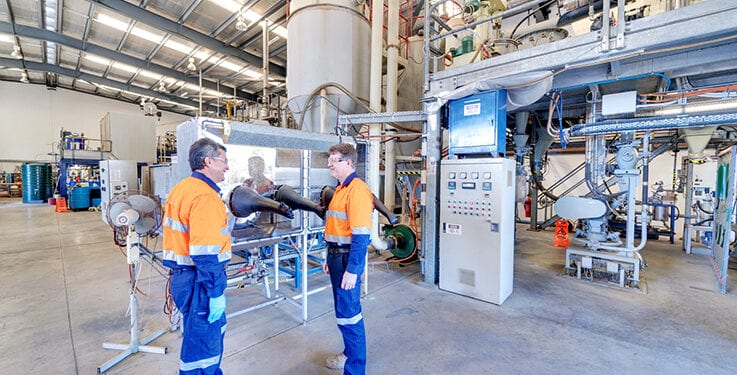Accepted As Unique Manufacturer Of LFP Cathode Powder
Lithium Australia NL’s (ASX: LIT) wholly-owned subsidiary VSPC Ltd has been granted an Australian patent for its proprietary cathode material manufacturing process.
VSPC is developing efficient and sustainable process technologies to manufacture materials for lithium-ion batteries (LIBs).
During the past two years, VSPC has simplified its process for the production of lithium metal phosphate cathode powders, enabling the use of a broader range of raw materials as feed. This has significantly reduced the cost of manufacturing lithium ferro phosphate (LFP) and other lithium metal phosphate materials, among them lithium manganese iron phosphate (LMFP). The VSPC process includes novel and inventive steps; hence, the filing of the patent.
Lithium Australia Managing Director, Adrian Griffin, said VSPC’s process technology offers numerous advantages with respect to the manufacture of both LFP and LMFP, including:
- Flexibility with respect to the types of lithium raw materials selected as feed – lithium phosphate, lithium carbonate or lithium hydroxide can be used.
- Precise, up-front control of process chemistry.
- The ability to control particle characteristics at both nano- and micro-scale.
- Simplified final-stage processing.
- Optimised product morphology for energy-storage applications.
Mr Griffin said VSPC’s patented process technology reduces chemical costs by 15%, which is considerable given that the chemicals used typically account for more than two-thirds of the entire cost of cathode material manufacture. The technology also integrates well with VSPC’s upstream technology for low-cost production of iron reagents – an outcome of work under a project co-funded by the AMGC (Advanced Manufacturing Growth Centre), this reduces chemical costs by a further 10%.
“Acceptance of the patent application for the production of phosphate-based cathode materials for LIBs is a great step forward for the company,” Mr Griffin said.
“Lithium Australia/VSPC can now provide practical solutions for electric vehicle manufacturers seeking cobalt-free batteries. Further, the company’s recent development of LMFP demonstrates the potential for phosphate-based, nickel- and cobalt-free batteries to achieve high energy densities, an ideal combination in terms of e-mobility applications.
“Patent protection will provide us with a significant cost advantage in the production cycle of what is currently the most rapidly expanding sector of the battery industry.”












